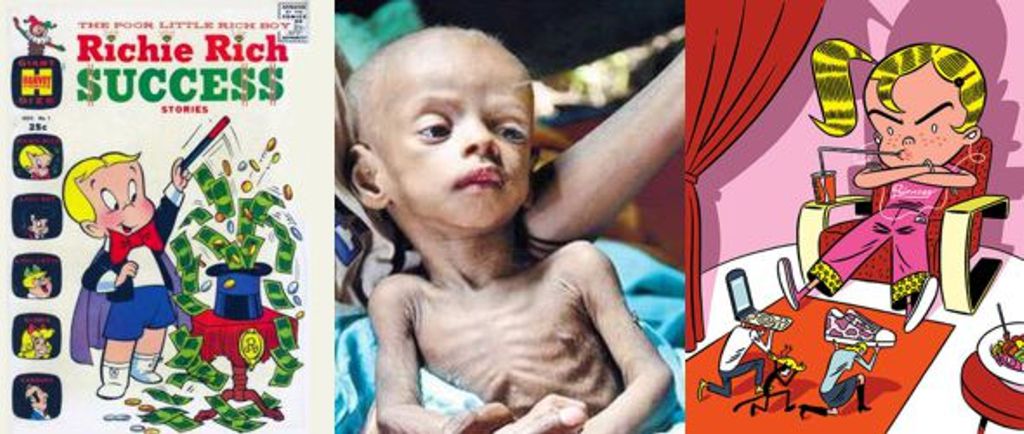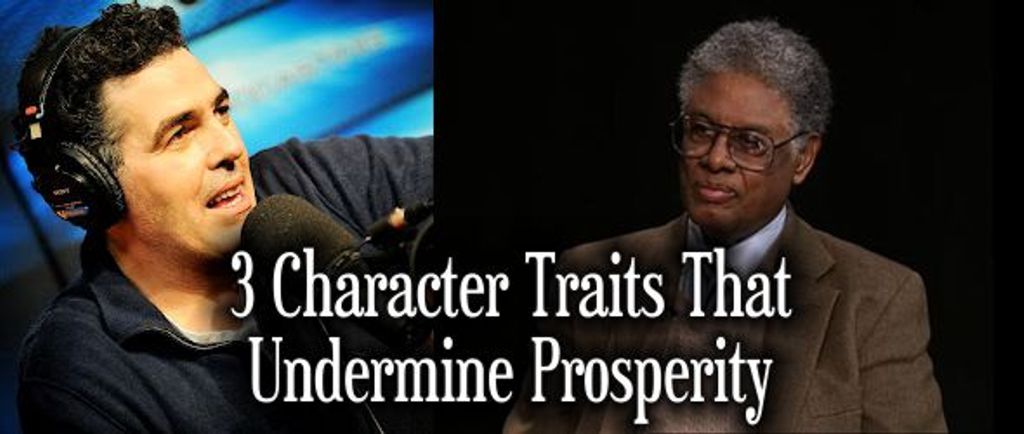Too much of a good thing can be very bad indeed.
“Middle-class society is being strained to the breaking point not, as Marx predicted, by ever-increasing misery but by ever-increasing affluence.” — Eric Hoffer
“Adversity makes men, and prosperity makes monsters.” — Victor Hugo
by John Hawkins – for PJ Media – It goes without saying that it’s better to be rich than poor. However, that doesn’t mean that affluence doesn’t have its own perils. People instinctively recognize this on a personal level. That’s why fabulously wealthy villains are a staple of TV and movies. It’s why we mock spoiled, rich celebrities like Meghan McCain, Paris Hilton, and Lindsay Lohan. It’s why many Americans, fairly or in most cases unfairly, tend to assume that the rich don’t understand what life is like for ordinary Americans. Of course, this bring to mind the following question: Why is it that so many Americans can recognize this when they see it in front of them with individuals, but fail to see the same things happening on a national level?
1) We’re forgetting how we got rich in the first place.
America is like a family that inherited a profitable business from a rich relative. Unfortunately, only some of the family members understand how the business works, while most of the rest just see a big cash machine that’s going to keep printing out money forever. This is not how the world works with companies or with nations.
Most Americans have no clue how exceptional the nation we live in is compared to the rest of the world. Depending on which source you use, America possesses somewhere between the 6th and 8th highest per capita income of any nation in the world. The nations ahead of us are all tiny little countries that range from under 100,000 people to a population of roughly 5.5 million. (Admittedly Canada, which benefits from trade with us and having us defend them militarily, has almost caught up). These tiny countries get by on tourism, natural resources, or small, highly educated populaces, and none of them could even come close to matching the success in a nation like ours which has almost 312 million people.
This country has been such an economic success for a number of reasons, including geographic isolation from Europe during its world wars, mineral resources, a Puritan work ethic, and lack of corruption — along with small government, low taxes, minimal regulations, a comparably small social safety net, and a pro-business atmosphere. Many of the factors enabling this country to grow so successful are eroding away, year after year, and that is sapping the vitality of our economy. Our “cash machine” slows down because so many Americans have no idea how to maintain it.
2) We’ve grown wasteful as a nation.
Not long ago, I did a HuffPostLive panel about the money the government spends on PBS. The biggest defense offered for spending 3 1/2 billion dollars over the next decade on a television station when hundreds of commercial channels exist? “It’s such a small amount of money.” On the one hand, that may be a small amount of money compared to some of the bigger expenditures we make. However, it’s also higher than the yearly gross domestic product of whole nations like Belize, Tonga, and Grenada. In other words, we’re going to spend more on Big Bird in the next decade than those entire countries will produce this year.
The scary thing is that most of us are okay with expenditures like this. Of course, when you spend a few billion here and a few billion there, it can add up in a hurry. Incidentally, that would have been a semi-funny, albeit geeky joke 20 years ago, but today, it’s not. That’s because the American people have grown so jaded about spending billions of dollars. On a smaller level, there are whole industries — cell phones, TV, automobiles — that rely on Americans disposing of perfectly good, still functional products in order to get more fashionable models. While it’s nice to have enough money to do that, it also tells you a lot about how most Americans think. They believe they have plenty of money, they expect the cash flow to continue, and they don’t see a need to hold back on spending a significant amount of money for even minor improvements.
3) We don’t have the same fire in the belly as a society.
For most of its history, America worked to prove that it was a country worthy of being considered in the same league as nations like Britain, France, and Germany. After WWII we became a superpower but we still competed with the Soviet Union. After the Evil Empire fell in 1991, we became lethargic as a nation because we were militarily and economically the strongest power on earth.
We’re so far ahead of other countries that we even fight wars with one hand tied behind our backs. Technologically, we’re not worried about another nation passing us in space. Economically, we’re not concerned about trying to keep ahead of the Chinese or the Russians. Instead of thinking about how to grow our economy, we’re spending more and more time trying to figure out how to divide the spoils we’ve already acquired — and make no mistake about it, those are two very, very different goals.
People, corporations, and countries don’t do their best work when they’re complacent. It’s competition that pushes us to go further and be better than we are. In our case, we’ve become a complacent nation, full of mostly complacent people who are happy to coast. That shows, not just in our politics but in our consumption-oriented, go-into-debt in order to shop-until-you-drop culture.
4) We have an entitlement mentality.
When you were growing up, you probably heard your mom say, “The world does not owe you a living.” Well, you’d THINK people would have heard that because a lot of Americans act like the world does owe them a living. One in seven Americans receives food stamps. Forty-seven percent pay no income taxes. Yet we’re told that people who’re successful need to pay even more of their money so that it can be given to other people by the government. It’s very telling that the people who already pay the most are being called “greedy” for not wanting to transfer more of their money over to demanding, unappreciative people who pay no income tax at all.
Getting beyond that, Americans have traditionally been some of the most individualistic, self-reliant people on earth. That’s how we managed to tame a vast, savage continent. Now, we believe it’s the government’s responsibility to handle our children’s schooling, guarantee our student loans, provide unemployment for months if we lose our jobs, and give us money for retirement and medical care when we get old. There was a time when Americans handled all of those things either by themselves or with the help of their families and churches.
Today, not only do we expect the government to take care of all those issues, we also demand to be treated at a hospital whether we have insurance or not, we think life should be better for us than for our parents and for our kids than it is for us, and many people seem to expect a job to magically appear for them in their local area just because they went to college. There’s nothing wrong with having high expectations, but there’s a world of difference between being willing to do what it takes to achieve at a high level and expecting life to be handed to you on a silver platter because you were fortunate enough to be birthed in America as opposed to some other corner of the planet.
5) We’re treating luxuries like necessities.
Have you ever had a conversation with someone about what life was like for many Americans in the Depression? I’ve heard stories about how peanut butter and soda pop were considered once-in-a-blue-moon treats, poor kids who were mocked for their long hair because their parents couldn’t get them a haircut, and families where kids had to wear worn-out, 10-year-old clothes passed down from older siblings.
Across the world, most people still live with that level of poverty. The median global per capita income is roughly $800 and more than a billion people live on less than a dollar a day.
They looked at the price of hundreds of goods in developing countries. And then with reference to national accounts, household surveys and census data, they calculated how much money you would need in each country to buy a comparable basket of essential goods that would cost you $1 in the USA.
You were under the global poverty line if you couldn’t afford that basket.
It’s still a reality of life for 13% of people in China; 47.5% in Sub-Saharan Africa; 36% in South Asia; 14% in East Asia and the Pacific; 6.5% in Latin America and the Caribbean. Almost 1.3bn people in total.
And surprisingly perhaps, people who live on $1 a day do not spend all of it on that basket of food – on staying alive. They typically spend about 40 cents on other things, says Professor Abhijit Banerjee of MIT.
Meanwhile, here in the U.S. we have people claiming they have a right to “health care” and demanding that the government help them with their mortgage. There’s ferocious opposition to cutting just about any and every government program you can imagine. Compared to much of the rest of the world, we are every bit as pampered as the movie star who demands a chauffeur-driven Limo and a giant bowl of red M&Ms just to come out of his posh trailer and work.
About the Author
John Hawkins is a professional writer who runs Right Wing News and Linkiest. He’s also the co-owner of the The Looking Spoon. Additionally, he does weekly appearances on the #1 in it’s market Jaz McKay show, writes a weekly column for Townhall and PJ Media, does YouTube videos, and his work has also been published at the Washington Examiner, The Hill, and at Human Events. Furthermore, he’s also the blogosphere’s premier interviewer and has interviewed conservatives like Thomas Sowell, Mark Levin, Victor Davis Hanson, Mark Steyn, G. Gordon Liddy, Dick Morris, Karl Rove, Michael Steele, Milton Friedman, Ron Paul, Jonah Goldberg, Jim DeMint, Walter Williams, Robert Novak, Ann Coulter, Newt Gingrich, & Michelle Malkin among others. Moreover, John Hawkins’ work has been linked and discussed in numerous publications and on TV and radio shows including ABC News, BusinessWeek, C-Span, The Chicago Tribune, CNN, Countdown with Keith Olbermann, Editor & Publisher, Fox News, Hannity and Colmes, The Laura Ingraham Show, Minneapolis Star Tribune, MSNBC, National Journal, National Post, Newsmax, Newsweek, The Philadelphia Inquirer, The Rush Limbaugh Show, The Tammy Bruce Show, Time Magazine, The Wall Street Journal, The Hugh Hewitt Show, The Washington Post, Salt Lake Tribune, Scarborough Country, U.S. News & World Report, WorldNetDaily and Human Events, where he had a weekly column. Right Wing News has been studied by college classes and even inspired an urban legend that was covered at Snopes. Last but not least, John Hawkins also founded and led the Rightroots group, a grassroots effort that collected almost $300,000 for Republican candidates in the last 3 months of the 2006 election cycle. In 2008, he consulted for Duncan Hunter’s presidential campaign and was on the board of Slatecard, which raised more than $600,000 for Republican candidates in the 2008 election cycle. In 2011, he helped found Raising Red, although he left the organization the same year and went on to become one of the co-founders of Not Mitt Romney.com.





